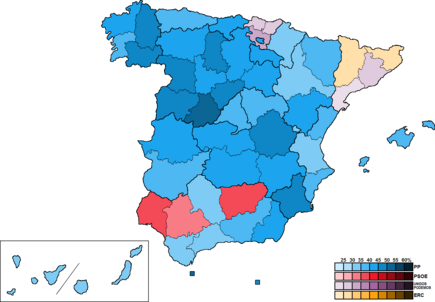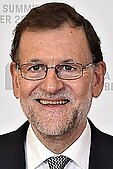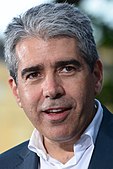Spanish general election, 2016
|
|
|||||||||||||||||||||||||||||||||||||||||||||||||||||||||||||||||||||||||||||||||||||||||||||||||||||
|---|---|---|---|---|---|---|---|---|---|---|---|---|---|---|---|---|---|---|---|---|---|---|---|---|---|---|---|---|---|---|---|---|---|---|---|---|---|---|---|---|---|---|---|---|---|---|---|---|---|---|---|---|---|---|---|---|---|---|---|---|---|---|---|---|---|---|---|---|---|---|---|---|---|---|---|---|---|---|---|---|---|---|---|---|---|---|---|---|---|---|---|---|---|---|---|---|---|---|---|---|---|
|
|||||||||||||||||||||||||||||||||||||||||||||||||||||||||||||||||||||||||||||||||||||||||||||||||||||
|
|
|||||||||||||||||||||||||||||||||||||||||||||||||||||||||||||||||||||||||||||||||||||||||||||||||||||
|
All 350 seats in the Congress of Deputies and 208 (of 266) seats in the Senate 176 seats needed for a majority in the Congress of Deputies |
|||||||||||||||||||||||||||||||||||||||||||||||||||||||||||||||||||||||||||||||||||||||||||||||||||||
| Opinion polls | |||||||||||||||||||||||||||||||||||||||||||||||||||||||||||||||||||||||||||||||||||||||||||||||||||||
| Registered | 36,520,913 |
||||||||||||||||||||||||||||||||||||||||||||||||||||||||||||||||||||||||||||||||||||||||||||||||||||
| Turnout | 24,279,259 (66.5%) |
||||||||||||||||||||||||||||||||||||||||||||||||||||||||||||||||||||||||||||||||||||||||||||||||||||
|
|||||||||||||||||||||||||||||||||||||||||||||||||||||||||||||||||||||||||||||||||||||||||||||||||||||

Constituency results map for the Congress of Deputies
|
|||||||||||||||||||||||||||||||||||||||||||||||||||||||||||||||||||||||||||||||||||||||||||||||||||||
|
|||||||||||||||||||||||||||||||||||||||||||||||||||||||||||||||||||||||||||||||||||||||||||||||||||||
The 2016 Spanish general election was held on Sunday, 26 June 2016, to elect the 12th Cortes Generales of the Kingdom of Spain. All 350 seats in the Congress of Deputies were up for election, as well as 208 of 266 seats in the Senate.
No party had secured a majority in the 2015 election, resulting in the most fragmented parliament since 1977. Ensuing negotiations failed to produce a stable governing coalition, paving the way for a repeat election on 26 June. The political deadlock marked the first time that a Spanish election was triggered due to failure in the government formation process. Ahead of the election, Podemos and United Left (IU) joined forces to form the Unidos Podemos alliance, along with several other minor left-wing parties. Opinion polling going into the election predicted a growing polarisation between this alliance and the People's Party (PP), which would be fighting to maintain first place nationally.
In the end, the alliance suffered a surprise decline in votes and vote share compared to the previous election, while the PP increased its number of votes and seats. The Spanish Socialist Workers' Party (PSOE), while clinging on to second place, kept losing votes and seats and scored a new historical low. Albert Rivera's Citizens (C's) suffered from the electoral system and fell to 32 seats. Voter turnout was the lowest since the transition to democracy in 1975, as just 66.5% of the electorate cast a ballot. Overall, a potential PP–C's bloc secured 6 more seats than before, but remained short of an overall majority. With the political deadlock settling in, commentators suggested that a new, third election could be eventually needed.
...
Wikipedia






